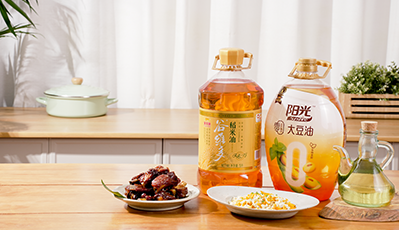In recent years, there has been a rapid increase in chronic diseases among Chinese residents due to excessive fat intake and poor fat quality.
Processing Status of Oil Industry in China - Over-Processing
Over-processing in cooking oil production is one of the prominent problems in grain and oil processing industry.
In order to ensure the compliant and stable quality of products, factories tend to be overly strict in their oil production control, leading to over-processing and many quality and safety risks, such as large amount of alkali and bleaching earth. This not only causes waste of resources and energy, intensifies environmental pollution, and increases oil loss, but also loses most of the natural and useful accompaniment of oils and fats, such as vitamin E and phytosterol, leading to a sharp drop of overall nutritional value of oil and the inevitable generation of new harmful substances, such as trans-fatty acids.
· Loss of Nutrients, Lower Nutritional Value of Cooking Oils
In China, vitamin E and phytosterol intakes are mainly from vegetable oil, but with the improvement of refining degree, the contents of them in vegetable oil are seriously dropped. On the one hand, consumers' intake of oil remains high; on the other hand, the intake of vitamin E and phytosterol from oil shows a downward trend, resulting in a significant discount in nutrition.
· Associated Risk Factors, Prominent Food Safety Concerns
Improper refining process will seriously reduce the nutritional quality of oil, and also produce a certain number of new harmful substances or risk factors, such as trans-fatty acid (TFA), 3-monochloropropane-1, 2-diol (3-MCPD), benzopyrene, etc., bringing about new food safety problems. Studies have shown that high intake of trans-fatty acids increases the risk of cardiovascular disease. In 2018, WHO announced the goal to eliminate industrially produced trans-fatty acids from food worldwide by 2023. Cooking oil is the main source of trans-fatty acids in Chinese diet. Surveys show that 50% of Chinese trans-fatty acid intake comes from vegetable oil. Therefore, the priority is to reduce or even eliminate trans-fatty acids in cooking oil.
Green precision minimal processing, an Important Path for Good Oil
By taking innovation as the priority, and integrating a number of core technologies, including raw material selection and control, enzymatic degluing coupled physical deacidification, moderate temperature long mix mild alkali refining, two-step decolorization, two-tower and two-temperature deodorization and two-stage collection, Yihai Kerry has developed a Green precision minimal processing technology for cooking oil with independent intellectual property rights. Green precision minimal processing of cooking oil is an advanced and reasonable processing process based on scientific understanding of the composition, distribution, migration and dose-effect relationship of major and micro constituents in oils and fats, and taking into account nutrition, taste, appearance, yield and cost of finished oil on the premise of meeting food safety requirements.
Compared with traditional over-processed cooking oil, the advantages of single oil and blend oil series products with free trans-fatty acids and high nutritional retention based on Green precision minimal processing technology include:
· A drop of the content of trans-fatty acids by more than 90%, reaching the standard of "Free trans-fatty acids"(≤0.3%).
· A retention rate of micro constituents increased by more than 20%. For example, the retention rate of vitamin E and phytosterol in corn oil, soybean oil, sunflower oil, rapeseed oil and rice oil can reach more than 80%; in addition, the retention rate of oryzol, a special ingredient in rice oil, can reach more than 90% after Green precision minimal processing.
· A drop of the content of pollutants. For example, the gibelalenone in corn oil is much lower than the EU standard (400μg/kg).
Green precision minimal processing technology enables cooking oil to successfully achieve "0 trans-fat acids, 80% nutrient retention", realizing a balance between health and nutrition, and improving the health, safety and nutrition of cooking oil to a new height.
In addition, compared with the traditional process, the green precision minimal processing can also:
· reduce steam consumption by 69%;
· reduce waste water discharge by 78%;
· reduce carbon emissions by 30%.
The technology effectively saves energy and reduces emissions, conforms to the concept of green low-carbon circular development, and is a veritable "green process".
Practicing the Concept of Moderate Processing in Grain Processing
Over-processing of rice not only leads to a sharp drop in nutrition and taste, but also causes excessive waste of resources.
Yihai Kerry has always believed that moderate processing in the rice industry is truly beneficial to the country and the people. Joining the rice industry in 2006 and after continuous trial, pilot and market feedback tracking of moderately processed products, Yihai Kerry has gradually established industry-leading rice processing methods and standards. The basic method of moderate processing is to use whiteness as the precision detection indicator to control the processing precision according to the white rice yield out of husked rice (weight of 1,000 whitening grains through single passage / 1,000 grains of brown rice) based on the characteristics of different varieties.
Moderate processing is the key process and important component of rice circular economy model of Yihai Kerry, which avoids the nutritional loss (such as vitamin B, oryzol, minerals and other micronutrients) and energy waste caused by over-processing, providing consumers with high-quality and healthy products.
Through industry conferences and academic exchanges, Yihai Kerry has shared the principle and experience of rice moderate processing with peers in the industry, providing a new path for the environmental-friendly development of the production process of the whole industry. In addition, the Group guides consumers to change their evaluation and consumption habits of rice quality through various media publicity and sales channel education.





































































































